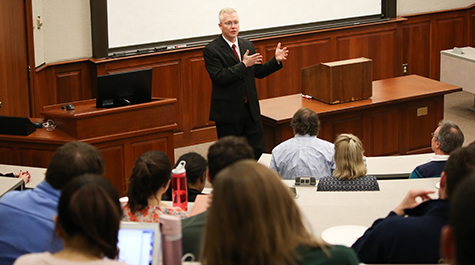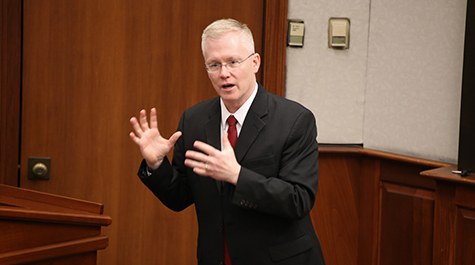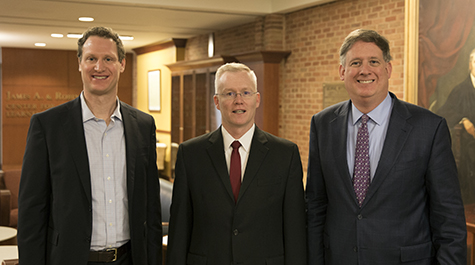Law School Hosts SEC Commissioner Michael S. Piwowar
During a talk at William & Mary Law School in March sponsored by the Law School’s Center for the Study of Law and Markets, Securities and Exchange Commissioner (SEC) Michael S. Piwowar gave a detailed overview of the SEC and answered student and faculty questions about the agency’s current focuses.
Commissioner Piwowar emphasized the SEC’s role as a disclosure regulator as opposed to a merits-based one. “We’re not a merits-based regulator; we are a disclosure regulator,” he said. “So, if you’re a company that wants to offer and sell your securities to the public, we mandate that you have to make certain disclosures to give investors the information they need in order to make informed investment decisions.”
Piwowar went on to describe the SEC’s role in writing rules and regulations under the federal securities statutes, monitoring compliance with them, and enforcing them. With respect to each, he noted the important role played by lawyers working alongside economists.
The same theme was noted by Professor Kevin Haeberle, a faculty fellow of the Center for the Study of Law and Markets and the faculty host of the event. In his introduction to Commissioner Piwowar’s talk, Haeberle focused on the importance of the Commissioner’s perspective as a financial economist and former finance professor. Haeberle also emphasized that the students in the audience who go on to practice in the securities area, whether with the government or in private practice, would find themselves working closely with economists at times. For that reason, he said, they should seek to build a strong working knowledge of at least the basics of financial economics in addition to their study of the securities laws themselves.
“It’s good to have policy makers with this kind of background in financial economics when you’re talking about regulating securities markets. But it’s also important to recognize the perspective that Commissioner Piwowar brings, because that branch of economics has become pervasive in the practice of law more generally,” Haeberle said. “Economists traditionally didn’t always work with lawyers; now they work hand in hand.”
Commissioner Piwowar also focused on the SEC’s three-part mission of protecting investors, maintaining fair and orderly and efficient markets, and facilitating capital formation. The latter focus, he said, was often pushed aside for six years because of work on Dodd-Frank, but is now getting more attention since the 2016 election.
“We’re focusing more on the capital formation part of our agenda, not trying to lessen any of the investor protections,” Piwowar said. “We’re going to try to grow the economy and then try to provide more access to capital for firms and more access to investment opportunities for everyday Americans.”
Piwowar was first appointed to the SEC by President Barack Obama and was sworn in to office on August 15, 2013. He was designated Acting Chairman of the Commission by President Donald Trump from January 23, 2017, to May 4, 2017.
Previously, Piwowar was the Republican chief economist for the U.S. Senate Committee on Banking, Housing, and Urban Affairs under Senators Mike Crapo (R-ID) and Richard Shelby (R-AL). He was the lead Republican economist on the four SEC-related titles of the Dodd-Frank Act and the JOBS Act. Piwowar also worked on a number of important SEC-related oversight issues under the jurisdiction of the Committee, such as securities, over-the-counter derivatives, investor protection, market structure, and capital formation.
About the Center for the Study of Law and MarketsThe Center for the Study of Law and Markets at William & Mary Law School seeks to advance the understanding of the role of legal institutions in promoting well-functioning markets in a free society. Learn more.
About William & Mary Law School
Thomas Jefferson founded William & Mary Law School in 1779 to train leaders for the new nation. Now in its third century, America's oldest law school continues its historic mission of educating citizen lawyers who are prepared both to lead and to serve.





